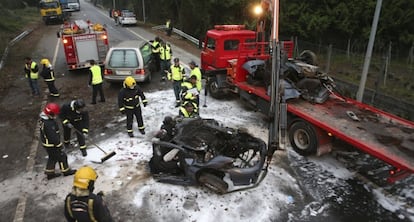Spain’s road accident death toll already past 1,000 victims in 2015
Figure similar to same period last year, when fatalities rose for first time in 10 years


More than 1,000 people have died in road accidents so far this year, according to preliminary figures released Thursday by Spain’s DGT traffic authority.
Between January 1 and November 18, the DGT recorded 1,003 deaths in accidents on Spanish roads – four more than over the same period in 2014.
“We find ourselves at a difficult moment when it comes to road safety in Spain,” said the DIA association of traffic victims. “It’s getting harder and harder to reduce the number of accidents.”
We find ourselves at a difficult moment when it comes to road safety in Spain” DIA association of traffic victims
After a decade of consecutive annual reductions in the number of road fatalities, the death toll began to rise again in 2014. This summer, traffic fatalities increased for the first time during that period since 2007.
“Traffic accidents continue to be a national problem,” the DGT stated. “A lot of people think that this is a thing of the past, but on the contrary. We cannot forget that an average five people die in accidents every day.”
After road deaths rose 40 percent in January and 14.5 percent in February compared to the same months last year, March and April ended with better numbers than in 2014.
The DGT has attributed these improvements to increased traffic patrols on secondary roads, where 80 percent of road fatalities occur, and to where it has now relocated all of its mobile speed cameras.
Despite last year’s rise in road deaths, Interior Minister Jorge Fernández Díaz has continued to defend the government’s road safety record: “We have set an example in this area. The figures show this,” he said less than a month ago during a gala held to celebrate the anniversary of a victims’ association.
Although motorists, victims’ families and researchers have been warning about the change in trend for months, the minister sought to play down last year’s figures. Interior Ministry officials have also repeatedly avoided acknowledging that there may be a problem.
“Pere Navarro [former DGT director during the previous government of Socialist Prime Minister José Luis Rodríguez Zapatero] set the bar very high,” Fernández Díaz said. “But we overcame that challenge. And I don’t regret replacing him with [current DGT director] María Seguí.”
Despite the increase in traffic deaths in 2014, the Interior Ministry has continued to defend the government’s road safety record
Fernández Díaz also avoided discussing the new proposed traffic policy drafted by Seguí’s office, which includes a measure to reduce the speed limit on secondary roads to 80km/h.
Seguí had hoped her proposal would be presented to Congress during this past session, but the Cabinet still has not approved it.
“I won’t be angry if it isn’t approved, but I have concerns,” she said back in September before Prime Minister Mariano Rajoy announced that elections would take place on December 20.
English version by Martin Delfín.
Tu suscripción se está usando en otro dispositivo
¿Quieres añadir otro usuario a tu suscripción?
Si continúas leyendo en este dispositivo, no se podrá leer en el otro.
FlechaTu suscripción se está usando en otro dispositivo y solo puedes acceder a EL PAÍS desde un dispositivo a la vez.
Si quieres compartir tu cuenta, cambia tu suscripción a la modalidad Premium, así podrás añadir otro usuario. Cada uno accederá con su propia cuenta de email, lo que os permitirá personalizar vuestra experiencia en EL PAÍS.
¿Tienes una suscripción de empresa? Accede aquí para contratar más cuentas.
En el caso de no saber quién está usando tu cuenta, te recomendamos cambiar tu contraseña aquí.
Si decides continuar compartiendo tu cuenta, este mensaje se mostrará en tu dispositivo y en el de la otra persona que está usando tu cuenta de forma indefinida, afectando a tu experiencia de lectura. Puedes consultar aquí los términos y condiciones de la suscripción digital.








































